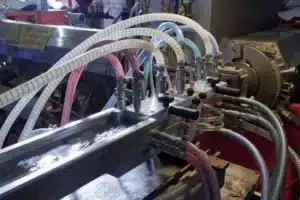The extrusion parameters plastics mechanical properties define the end-use performance of extruded plastic profiles. By orienting polymer chains and increasing material density, variables like extrusion parameters, temperature, pressure, and screw speed determine the mechanical properties plastics such as tensile strength, elasticity, and ductility.
Mechanical properties plastics: definition and relevance in extrusion
Mechanical properties plastics refer to how materials respond under stresses like tension, compression, bending, or impact. These properties are essential to ensure reliability and performance of extruded profiles in structural, technical, or aesthetic applications. Engineers must evaluate these properties to select the correct polymer for new profiles or seals based on required performance.
Key mechanical properties in extruded plastics
Extruded plastics must withstand external forces without failure or deformation. Critical mechanical properties plastics include:
-
Tensile strength: resistance to pulling before breaking
-
Compressive strength: ability to resist crushing
-
Flexural strength: resistance to bending or curvature
-
Impact strength: durability against sudden shocks
-
Hardness: resistance to scratches, dents, or penetration
-
Elasticity: ability to return to original shape after load removal
-
Resilience: maintaining structural integrity under impact
-
Toughness: energy absorption before fracturing
These properties vary with polymer type and are significantly affected by extrusion parameters such as temperature and screw speed.
Why mechanical properties plastics matter in extrusion
During extrusion, polymers undergo high temperatures, compression, traction, and cooling—all of which alter molecular alignment and final mechanical properties plastics. Choosing or modifying a polymer via optimized extrusion parameters enables:
-
robust technical profiles
-
lightweight yet durable extrusions
-
long-lasting flexible seals
-
profiles compliant with mechanical performance standards
Thus, the mechanical properties plastics are not static but engineered through polymer chemistry and extrusion.
Extrusion parameters plastics mechanical properties: process effects
The various parameters of the plastic extrusion process — temperature, speed, pressure, flow, and extruder configuration — directly affect the mechanical performance of the final product.
-
Melting temperature
-
Low: incomplete melting, poor homogeneity, weak strength, dull surface
-
Optimal: strong mechanical results and smooth finish
-
High: polymer degradation, brittleness, visual defects
-
-
Extrusion speed
-
Slow: overheating, strength loss
-
Optimal: balanced performance
-
Fast: improper melting, low transparency, deformation
-
-
Pressure
-
Low: flow defects, discontinuity, porosity
-
Optimal: uniform flow and structure
-
High: internal stresses, micro-cracks, strength reduction
-
-
Material flow rate
-
Low: slow production
-
Optimal: high quality and efficiency
-
High: poor process control and structural defects
-
-
Extruder configuration
The extruder type and screw geometry profoundly influence extrusion parameters plastics mechanical properties by controlling mixing, additive distribution, temperature, and pressure.-
Single-screw extruders: basic, suitable for standard polymers, limited mixing
-
Twin-screw extruders: enhanced mixing and additive dispersion, ideal for reinforced or specialty materials
-
Co‑extruders: enable layered structures, skin layers with enhanced surface properties (UV resistance, scratch resistance)
-
Material attributes affecting plastic extrusion
Intrinsic polymer properties influence extrusion quality:
-
Melt flow index (MFI)
-
High: low viscosity → easy flow but deformation risk
-
Low: high viscosity → processing challenges and micro-cracks
-
-
Thermal stability
-
High stability → resistance to heat degradation, preserving mechanical properties plastics
-
-
Viscosity
-
Too high: energy-intensive, risk of clogging
-
Too low: loss of shape or dimensional accuracy
-
Comparative table: extrusion parameters vs. mechanical properties
| Parameter | Effect on mechanical properties | Critical process conditions |
|---|---|---|
| Melting temperature | Strength, homogeneity, surface finish | Too low: poor melt; too high: degradation |
| Extrusion speed | Mechanical strength, optical clarity | Too high: incomplete melt; too low: degradation |
| Pressure & flow | Structural homogeneity, defects | Excessive/unstable → micro-cracks, stress |
| Extruder configuration | Homogeneity, additive dispersion, mechanical quality | Single-screw: limited mixing; twin-screw: superior |
| MFI (viscosity) | Flow behavior, dimensional accuracy | Too high: deformation; too low: flow issues |


